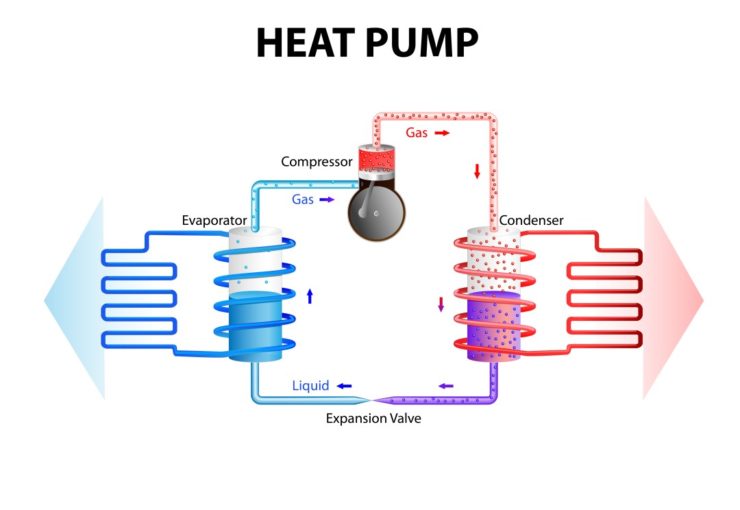
Heat pumps are not a new technology. In fact, you have to travel back to 1852, when William Thomson established the 1st and 2nd laws of thermodynamics – a new branch of Physics. Thermodynamics studies heat and temperature, and their relationship with energy and matter. Naturally, he would figure out the basics of the heat pump. Thomson was later “ennobled” and became the 1st Baron of Kelvin, thanks to his contributions to the science of thermodynamics. (Ever hear of the Kelvin scale? Kelvin is the primary unit of temperature measurement in the physical sciences, and is often used in conjunction with the degree Celsius.)
At their most basic, heat pumps use electricity to move heat from a cool space to a warm space – making the cool space cooler and the warm space warmer. During the colder months, heat pumps move relative heat from the outdoors into your warm house, and during the cooling season, heat pumps move heat from your cool house into the warm outdoors. Because they move heat rather than generate heat, heat pumps can provide equivalent space conditioning at as little as one-quarter of the cost of operating conventional heating or cooling appliances.
There are three types of heat pumps: air-to-air, water source, and geothermal. They collect heat from the air, water, or ground outside your home and concentrate it for use inside.
The most common type of heat pump is the air-source heat pump, which transfers heat between your house and the outside air. Today’s heat pump can reduce your electricity use for heating by approximately 50% compared to electric resistance heating such as furnaces and baseboard heaters. High-efficiency heat pumps also dehumidify better than standard central air conditioners, resulting in less energy usage and more cooling comfort in summer months. Air-source heat pumps have been used for many years in nearly all parts of the United States, but until recently they have not been used in areas that experienced extended periods of subfreezing temperatures. However, in recent years, air-source heat pump technology has advanced so that it now offers a legitimate space heating alternative in colder regions.
For homes without ducts, air-source heat pumps are also available in a ductless version called a mini-split heat pump. In addition, a special type of air-source heat pump called a “reverse cycle chiller” generates hot and cold water rather than air, allowing it to be used with radiant floor heating systems in heating mode. We have found these to be some of the most popular units – and they fit in almost any setting.
Geothermal heat pumps achieve higher efficiencies by transferring heat between your house and the ground or a nearby water source. Although they cost more to install, geothermal heat pumps have low operating costs because they take advantage of relatively constant ground or water temperatures. Geothermal (or ground source) heat pumps have some major advantages. They can reduce energy use by 30%-60%, control humidity, are sturdy and reliable, and fit in a wide variety of homes. Whether a geothermal heat pump is appropriate for you will depend on the size of your lot, the subsoil, and the landscape. Ground-source or water-source heat pumps can be used in more extreme climates than air-source heat pumps, and customer satisfaction with the systems is very high.
A new type of heat pump for residential systems is the absorption heat pump, also called a gas-fired heat pump. Absorption heat pumps use heat as their energy source, and can be driven with a wide variety of heat sources.
Although most heat pumps use electric resistance heaters as a backup for cold weather, heat pumps can also be equipped with burners to supplement the heat pump. Back-up burners help solve the problem of the heat pump delivering relatively cool air during cold weather and reduces its use of electricity. There are few heat pump manufacturers that incorporate both types of heat supply in one box, so these configurations are often two smaller, side-by-side, standard systems sharing the same ductwork. The combustion fuel half of the system could be propane, oil, or even wood.
Sources: Wikipedia, and https://www.energy.gov/energysaver/heat-and-cool/heat-pump-systems)
